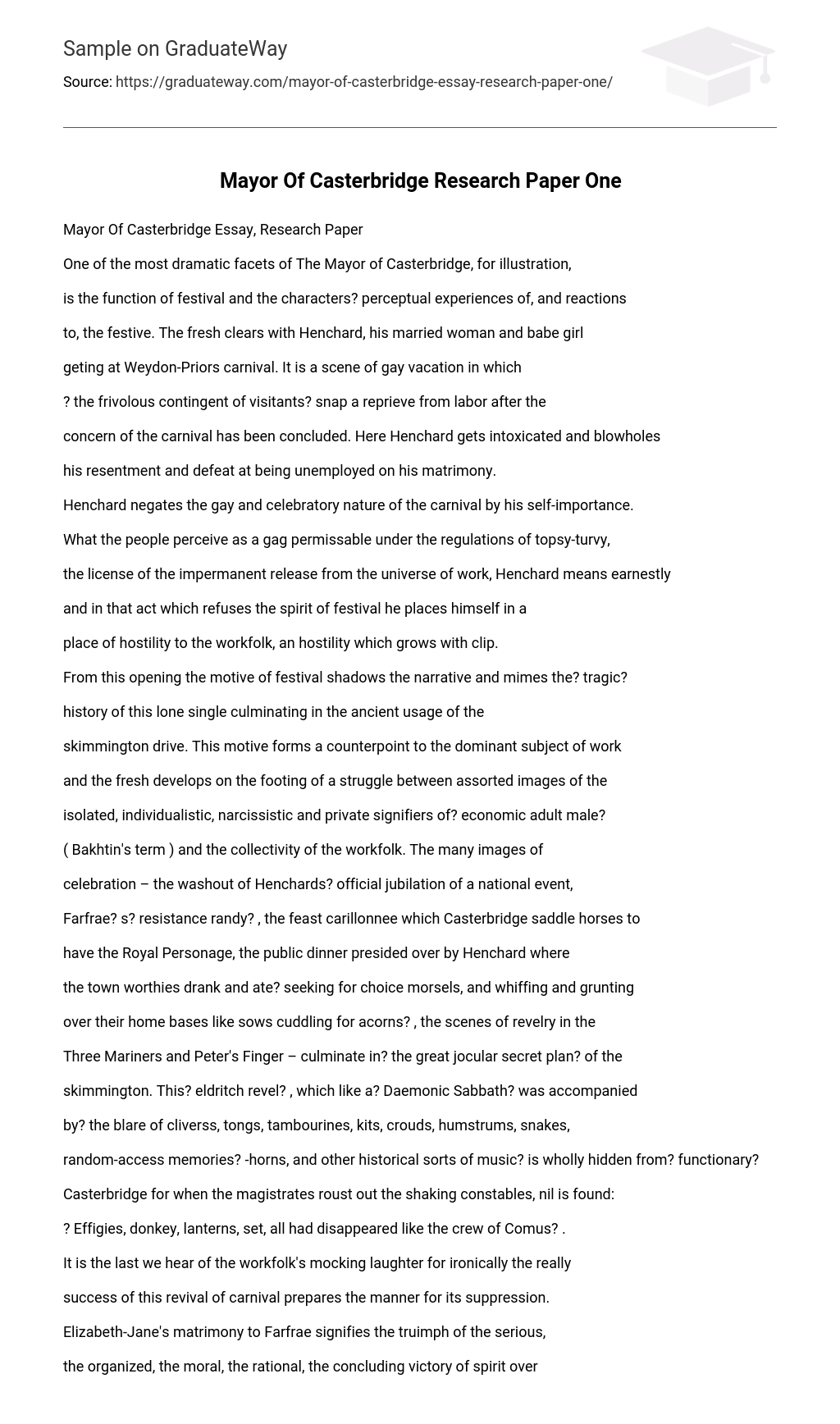One of the most dramatic facets of The Mayor of Casterbridge, for illustration,is the function of festival and the characters perceptual experiences of, and reactions to, the festive. The fresh clears with Henchard, his married woman and babe girl geting at Weydon-Priors carnival. It is a scene of gay vacation in which the frivolous contingent of visitants snap a reprieve from labor after the concern of the carnival has been concluded. Here Henchard gets intoxicated and blowholes his resentment and defeat at being unemployed on his matrimony.
Henchard negates the gay and celebratory nature of the carnival by his self-importance. What the people perceive as a gag permissable under the regulations of topsy-turvy, the license of the impermanent release from the universe of work, Henchard means earnestly and in that act which refuses the spirit of festival he places himself in a place of hostility to the workfolk, an hostility which grows with clip.
From this opening the motive of festival shadows the narrative and mimes the tragic history of this lone single culminating in the ancient usage of the skimmington drive. This motive forms a counterpoint to the dominant subject of work and the fresh develops on the footing of a struggle between assorted images of the isolated, individualistic, narcissistic and private signifiers of economic adult male ( Bakhtin’s term ) and the collectivity of the workfolk.
The many images of celebration – the washout of Henchards official jubilation of a national event, Farfraeresistance randy , the feast carillonnee which Casterbridge saddle horses to have the Royal Personage, the public dinner presided over by Henchard where the town worthies drank and ate seeking for choice morsels, and whiffing and grunting over their home bases like sows cuddling for acorns , the scenes of revelry in the Three Mariners and Peter’s Finger – culminate in the great jocular secret plan of the skimmington.
This eldritch revel , which like a Daemonic Sabbath was accompanied by the blare of cliverss, tongs, tambourines, kits, crouds, humstrums, snakes, random-access memories -horns, and other historical sorts of music is wholly hidden from functionary Casterbridge for when the magistrates roust out the shaking constables, nil is found: Effigies, donkey, lanterns, set, all had disappeared like the crew of Comu.
It is the last we hear of the workfolk’s mocking laughter for ironically the really success of this revival of carnival prepares the manner for its suppression. Elizabeth-Jane’s matrimony to Farfrae signifies the truimph of the serious, the organized, the moral, the rational, the concluding victory of spirit over the disorganized, the passionate, the festive, the flesh. The kernel of Elizabeth-Jane’s character is restraint and, like Farfrae s, her actions are characterized by their rationality and her perceptual experience of the universe is systematically tragical.
In the shutting transitions of the fresh she reflects that joy is no longer an built-in portion of life but an interlude in a general play of hurting, a sentiment which signals the triumph of Christian morality over passion, the concluding victory of the morality of the pale Galilean. That surely is Hardy’s purpose, but in the really ambiguity of that triumph the restrictions of the ideaology of the thought universe are revealed exactly through the colonial position of the people over whom the new ideological signifiers now rule.
Those ideological discourses which speak of integrity and harmoniousness and catholicity are put into contradiction by images of suppression, domination, struggle, non by virtuousness of the images per Se but because they enable us to see the outside of a discourse which, claiming to be cosmopolitan, has no bounds. In their periodic effusions of heathen jubilation the workfolk throw off the inflictions of soberness and reputability in a self-generated rebellion against societal order in which anyone who partakes becomes involved.





